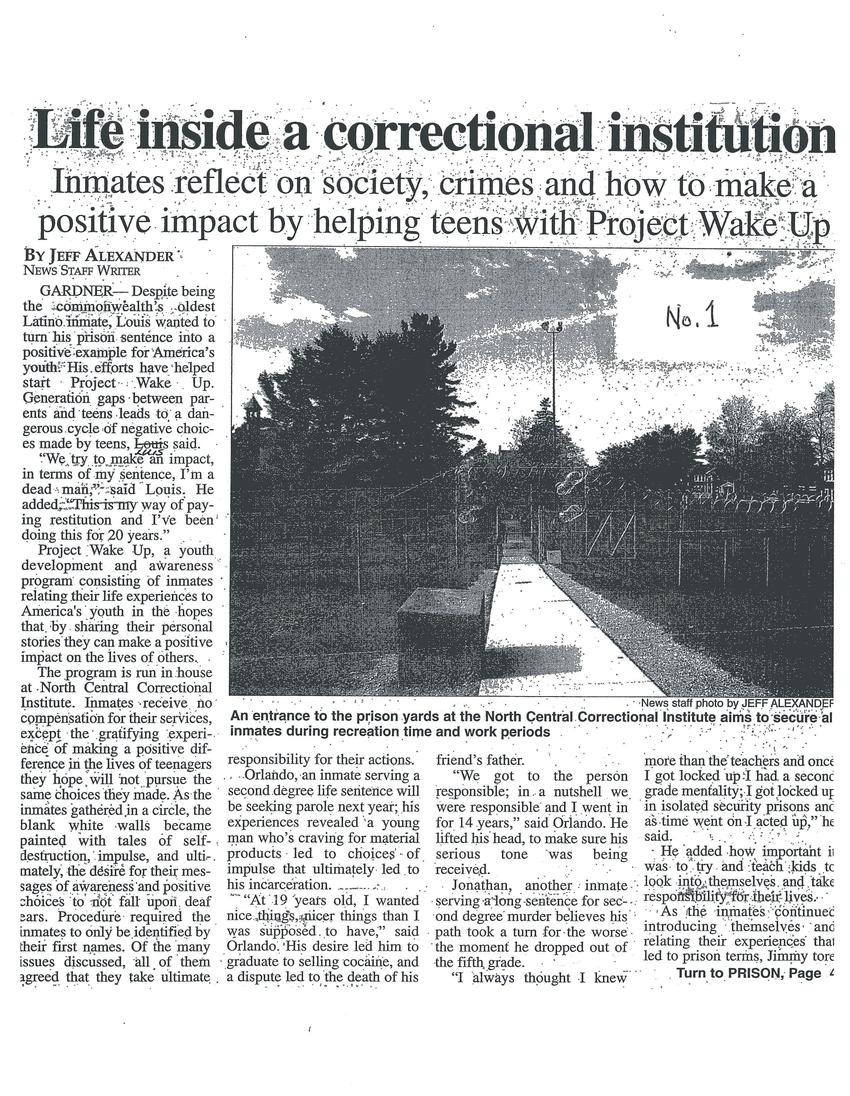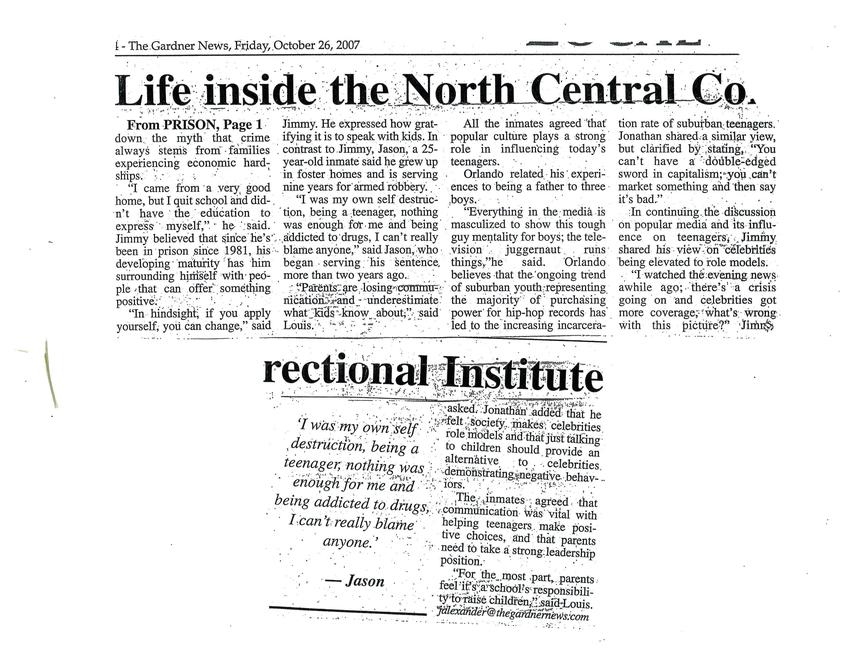
Transcription
Life inside a correctional institution
Inmates reflect on society, crimes and how to make up positive impact by helping teens with Project Wake Up
By Jeff Alexander
News Staff Writer
[photo of prison yard. Credit: News staff photo by JEFF ALEXANDER. Caption: An entrance to the prison yards at the North Central Correctional Institute aims to secure all inmates during recreation time and work periods.]
GARDNER—Despite being the commonwealth's oldest Latino inmate, Louis wanted to turn his prison sentence into a positive example for America's youth. His efforts have helped start Project wake Up. Generation gaps between parents and teens leads to a dangerous cycle of negative choices made by teens, Louis said.
"We try to make an impact, in terms of my sentence, I'm a dead man," said Louis. He added, "This is my way of paying restitution and I've been doing this for 20 years."
Project Wake Up, a youth development and awareness program consisting of inmates relating their life experiences to America's youth in the hopes that by sharing their personal stories they can make a positive impact on the lives of others.
The program is run in house at North Central Correctional Institute. Inmates receive no compensation for their services, except the gratifying experience of making a positive difference in the lives of teenagers they hope will not pursue the same choices they made. As the inmates gathered in a circle, the blank white walls became painted with tales of self-destruction, impulse, and ultimately, the desire for their messages of awareness and positive choices to not fall upon deaf ears. Procedure required the inmates to only be identified by their first names. Of the many issues discussed, all of them agreed that they take ultimate responsibility for their actions.
Orlando, an inmate serving a second degree life sentence will be seeking parole next year; his experiences revealed a young man whose craving for material products led to choices of impulse that ultimately led to his incarceration.
"At 19 years old, I wanted nice things, nicer things than I was supposed to have," said Orlando. His desire led him to graduate to selling cocaine, and a dispute led to the death of his friend's father.
"We got to the person responsible; in a nutshell we were responsible and I went in for 14 years," said Orlando. He lifted his head, to make sure his serious tone was being received.
Jonathan, another inmate serving a long sentence for second degree murder, believes his path took a turn for the worse the moment he dropped out of the fifth grade.
"I always thought I knew more than the teachers, and once I got locked up, I had a second grade mentality. I got locked up in isolated security prisons and, as time went on, I acted up," he said.
He added how important it was to try and teach kids to look into themselves and take responsibility for their lives.
As the inmates continued introducing themselves and relating their experiences that led to prison terms, Jimmy tore down the myth that crime always stems from families experiencing economic hardship.
"I came from a very good home, but I quit school and didn't have the education to express myself," he said. Jimmy believed that since he's been to prison since 1981, his developing maturity has him surrounding himself with people that can offer something positive.
"In hindsight, if you apply yourself, you can change," said Jimmy. He expressed how gratifying it is to speak with kids. In contrast to Jimmy, Jason, a 25-year-old inmate, said he grew up in foster homes and is serving nine years for armed robbery.
"I was my own self-destruction, being a teenager, nothing was enough for me and, being addicted to drugs, I can't really blame anyone," said Jason, who began serving his sentence more than two years ago.
"Parents are losing communication and underestimate what kids know about," said Louis.
All the inmates agreed that popular culture plays a strong role in influencing today's teenagers.
Orlando related his experiences to being a father to three boys.
"Everything in the media is masculized to show this tough guy mentality for boys; the television juggernaut runs things," he said. Orlando believes that the ongoing trend of suburban youth representing the majority of purchasing power for hip-hop records has led to the increasing incarceration rate of suburban teenagers. Jonathan shared a similar view, but clarified by stating, "You can't have a double-edged sword in capitalism; you can't market something and then say it's bad."
In continuing, the discussion on popular media and its influence on teenagers, Jimmy shared his view on celebrities being elevated to role models.
"I watched the evening news awhile ago; there's a crisis going on and celebrities got more coverage; what's wrong with this picture?" Jimmy asked. Jonathan that he felt society makes celebrities role models and that just talking to children should provide an alternative to celebrities demonstrating negative behaviors.
The inmates agreed that communication was vital with helping teenagers make positive choices, and that parents need to take a strong leadership position.
"For the most part, parents feel it's a school's responsibility to raise children," said Louis.
jalexander@thegardnernews.com
Other posts by this author
|
2023 feb 2

|
2022 dec 26

|
2022 nov 5

|
2022 aug 23

|
2022 jun 23

|
2022 may 4

|
More... |



Replies